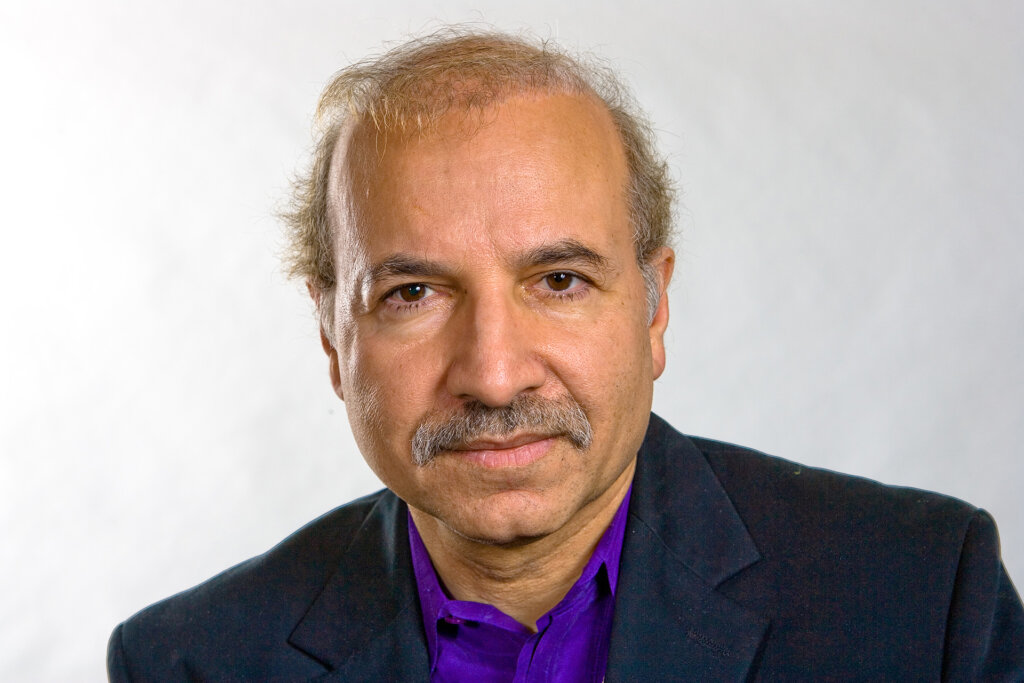This Spring, A.J Racy, distinguished professor of ethnomusicology, will retire from the School of Music following a 40+ year career spanning teaching, performance and research with the nation’s preeminent Department of Ethnomusicology. An internationally renowned performer, composer and author, Racy is respected for his musicianship and publications including the award winning book, “Making Music in the Arab World: The Culture and Artistry of Tarab.” He has received numerous honors and is a master of multiple traditional instruments including the nay, a reed-flute and buzuq, a long-necked fretted lute.
In honor of Professor Racy’s expansive career and dedication to student success, the School of Music has established the A.J. Racy Scholarship in Ethnomusicology to support graduate and undergraduate scholars in their studies. To celebrate Professor Racy’s career with a gift to this fund, click here.
We recently shared a conversation with Dr. Racy to discuss his career at UCLA, how the field of ethnomusicology continues to be a source of inspiration for him, and his plans for retirement.
Q: What have you enjoyed most about your time teaching at UCLA and for the Department of Ethnomusicology?
Teaching at UCLA for 43 years (1978-2021) has been a valuable and special period in my life. Besides developing my skills as an educator, I have enjoyed working with students as they pursue their ideas and creative paths. I am proud when they establish their own careers and particularly when they take an interest in the field of ethnomusicology.
Q: What inspires you about the field of ethnomusicology?
Great teachers and thinkers, such as the late Professor Bruno Nettl, inspired me to become an ethnomusicologist. The discipline appeals to me as it combines the study of world music with related cultural theory. Ethnomusicologists usually become specialists in both particular issues and areas in different locations. I am a musician-composer and multi-instrumentalist, who has studied several traditions and musical practices. Besides teaching instruments of the Near East and certain related topics classes and seminars, I have also covered the history and changing orientations of ethnomusicology theory.
Q: Is there an accomplishment or milestone you are most proud of during your time at UCLA?
Highlighting the three areas of my work, namely performance, composition, and scholarship, three items come to mind. For performance, I would say the Strings and Soul concert at UCLA, where I performed with Kenny Burrell and Shujaat Khan. Regarding my compositions, I would select my piece “Ecstasy,” which was recorded by the Kronos Quartet on their CD “Kronos Caravan.” I also played nay (reed flute) on the recording, and we performed it live in many places. In the arena of scholarship, my book, “Making Music in the Arab World: The Culture and Artistry of Tarab” (Cambridge University Press, 2003), won first place in the prestigious British Kuwait Friendship Society Book Prize for the best book on the Middle East for 2004.
Q: What will you miss most about your time at UCLA?
The things I will miss most after retirement include the peaceful ambiance of the UCLA campus, the guest lectures on various related topics and world music performances at university venues. I will also miss many colleagues and staff, as well as the undergraduate and graduate students with whom I have worked. I have always treated the process of teaching as an art form that includes thoughtful collaboration between the teacher and the student.
Q: Do you have any exciting plans or goals for retirement?
In retirement, I envision an active and busy life that embraces research, writing, and publishing, as well as music composing, recording, and performing. My brothers and friends have encouraged me to write my life history, or autobiography. I plan to work on that and other projects. Meanwhile, I may continue to give lessons on the nay at the week-long summer Arabic Music Retreat. I am also looking forward to joint projects with my wife, Dr. Barbara Racy, who is a California licensed clinical psychologist and dance ethnologist. I also look forward to sharing vacations in our summer home on the coast of Maine with my stepson, Robert Moser, Associate Professor of Portuguese at the University of Georgia (UGA), and his wife, who also works at UGA, and two granddaughters who will be going to college in a few years.
Q: Do you have any guiding words of wisdom that you would be able to share with our UCLA School of Music community?
I quote the Dalai Lama in his foreword to the book “His Holiness: The Dalai Lama” (teNeues Publishing UK, Ltd., 2009), page 5: “First of all, as a human being I believe that we are all the same in that we all want happiness and do not want suffering. So my first commitment is to the promotion of human values, such as compassion, forgiveness, tolerance, contentment and self-discipline, because in my limited experience it is by fostering such values that we make ourselves happier.”


